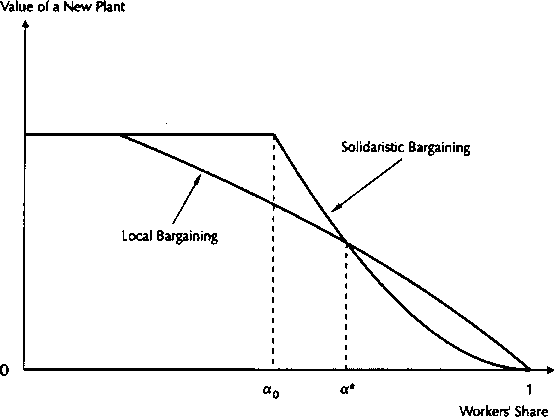88
Karl Ove Moene and Michael Wallerstein
Figure 3

(and thus lowers investment) while solidaris-
tic bargaining has no effect. Thus, if α is
such that the wage with Solidaristic bargai-
ning is not much above workers' outside
option, Solidaristic bargaining raises the mar-
ket value of new plants relative to local bar-
gaining. Since the number of new plants
built is an increasing function of the market
value of new plants, entry is greater with soli-
daristic bargaining when CC is sufficiently low
(cc<α* in Figure 3).
As a increases, the productivity dif-
ference between the most efficient plant and
the industry average declines. At high level of
OC, wages are close to average productivity
and profits are low per period of operation in
either bargaining system. The period of time
over which plants are kept in operation,
however, is much shorter with Solidaristic
bargaining than with local bargaining when
alpha is high. Thus, the value of new plants
is higher with local bargaining than with
Solidaristic bargaining if alpha is sufficiently
large.7
Employment and Output
Total industry employment displays the
same pattern as the number of new plants. If
OC is not too large, employment is higher
with Solidaristic bargaining for the same rea-
sons that entry is higher. When α is low
enough to have a small effect with industry-
wide bargaining but sufficiently high to
increase the wage in the most productive
plants, employment and output is lower with
decentralized bargaining than with solidaris-
tic bargaining. The greater entry of new
plants under Solidaristic bargaining more
than compensates for the earlier closing of
older plants. When α is close to one, howe-
ver, both the age at which plants are closed
and the number of new plants that are built
is greater with local bargaining. Therefore,
employment and output are relatively higher
with decentralized bargaining when Ct is suf-
ficiently high.
Employers ' Wealth
Whatever the bargaining system, firms invest
until the value of new plants equals the cost
More intriguing information
1. Evolutionary Clustering in Indonesian Ethnic Textile Motifs2. Conservation Payments, Liquidity Constraints and Off-Farm Labor: Impact of the Grain for Green Program on Rural Households in China
3. Trade Liberalization, Firm Performance and Labour Market Outcomes in the Developing World: What Can We Learn from Micro-LevelData?
4. Temporary Work in Turbulent Times: The Swedish Experience
5. The name is absent
6. The name is absent
7. Bridging Micro- and Macro-Analyses of the EU Sugar Program: Methods and Insights
8. The name is absent
9. CREDIT SCORING, LOAN PRICING, AND FARM BUSINESS PERFORMANCE
10. CROSS-COMMODITY PERSPECTIVE ON CONTRACTING: EVIDENCE FROM MISSISSIPPI